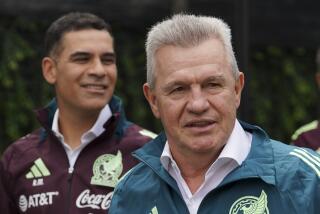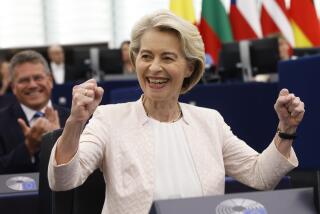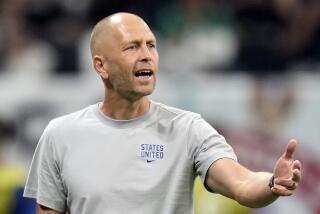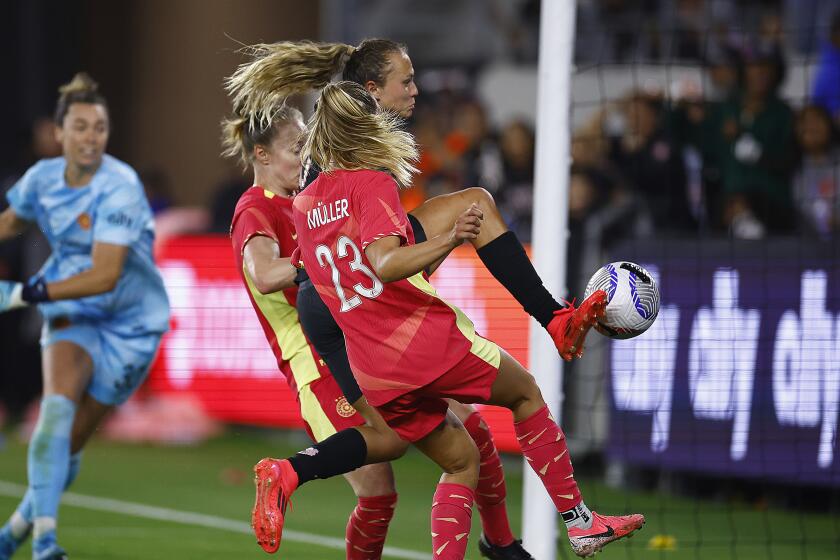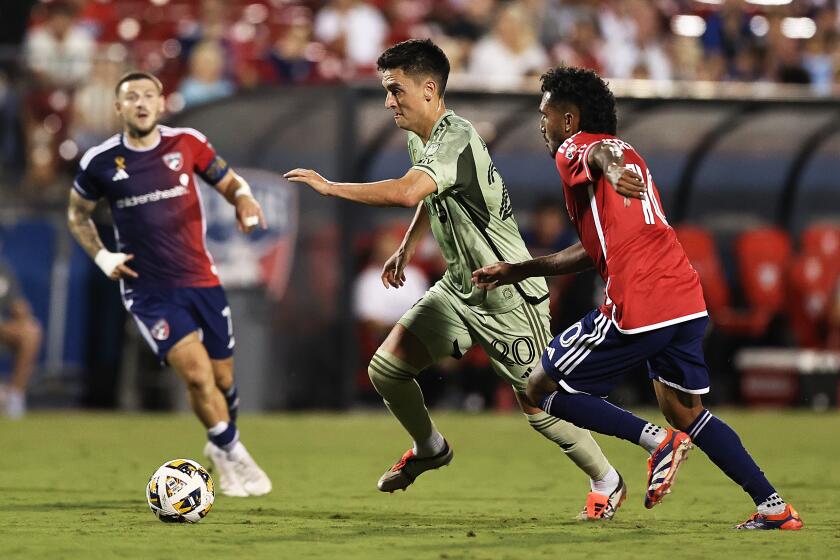Joseph ‘Sepp’ Blatter reelected as FIFA president amid tumult
This was Joseph “Sepp” Blatter on Wednesday morning, hours before the 75-year-old Swiss was reelected to a fourth term as president of FIFA, international soccer’s scandal-ridden ruling body:
“I am the captain of the ship and we are weathering the storm,” Blatter said. “Our ship is in troubled water and this is why we need to put the ship back on course — and for that we need a leader.”
This was Blatter on Wednesday evening, after delegates representing FIFA’s 208 member countries had given him a new four-year mandate in a lopsided 186-17 vote:
“We are going to put FIFA’s ship back on the right course, in clear, transparent waters,” he said. “We will need some time; we cannot do it from one day to the next.”
The storm warnings were out for Blatter on a dramatic day in Zurich.
His supporters successfully rebuffed a last-minute attempt by England to postpone the vote, but Germany asked for a review of the decision to award the 2022 World Cup to Qatar; Europe’s top clubs said from now on they would demand a say in FIFA decisions that affect them; and soccer’s North and Central American and Caribbean (CONCACAF) region showed every sign of splitting asunder.
Nautical references were the order of the day because Blatter’s only rival for the presidency, Qatar’s Mohamed bin Hammam, had been sunk before the first ballot was cast. Bin Hammam was provisionally suspended from all soccer activity Sunday by FIFA’s ethics committee for his alleged attempt to bribe Caribbean soccer leaders.
That, in turn, led to the firing of Chuck Blazer, the lone American on FIFA’s executive committee and the man who blew the whistle on the alleged bribery. He was reinstated, then fired again, and his true position was uncertain Wednesday night.
Meanwhile, when Bin Hammam tried to attend FIFA’s 61st Congress on Wednesday as an observer, he was barred by soccer’s movers and shakers from entering the Zurich gathering.
Bin Hammam said in a statement: “I will never accept how my name and my reputation have been damaged. I will fight for my rights.”
Bin Hammam, who has been replaced as president of the Asian Football Confederation by China’s Zhang Jilong, might well reflect on words he uttered only two weeks ago: “I firmly believe FIFA, as a decision-making body and as an organization, isn’t corrupt.”
Also due to do some reflecting is David Bernstein, chairman of England’s Football Assn.
With the support of his Scottish Football Assn. counterpart, Bernstein tried Wednesday morning to get the Congress to postpone the vote until reform-minded candidates could be found to make it an election rather than a coronation.
“Only with a contested election will the winner have . . . a proper, credible mandate,” Bernstein said in a speech to delegates.
His words were ignored and his proposal was shot down, 172-17.
In fact, the delegates reacted with what appeared to be an orchestrated attack on England by Blatter supporters that was remarkable for its ferocity. The outpouring of scorn came from small soccer nations such as Cyprus, Benin and the Democratic Republic of the Congo.
But there was also a verbal barrage aimed at England’s government and its investigative media by Julio Grondona, the 79-year-old president of the Argentine Football Assn. and a FIFA senior vice president and Blatter ally who himself has frequently been the target of corruption charges in Argentina and abroad.
“Leave the FIFA family alone,” Grondona said. “We always have attacks from England. Their journalism is more busy lying than telling the truth.”
The one man who might have successfully challenged Blatter, former French star Michel Platini, now the head of UEFA, European soccer’s governing body, opted not to run. Platini could be the front-runner in four years, when Blatter has said he would step down, although FIFA executive committee members Ricardo Texeira of Brazil and Chung Mong-joon of South Korea also are likely to test the waters.
Despite his overwhelming victory, there are storm clouds on the horizon for Blatter.
On Wednesday, Theo Zwanziger, president of Germany’s powerful and influential soccer federation, again brought into question how Qatar had won the right to stage the 2022 World Cup ahead of the U.S., which it defeated in a 13-4 vote by FIFA executive committee members.
“There is a considerable degree of suspicion that one cannot simply sweep aside,” he told German television reporters, “and I must expect that awarding this World Cup under these conditions needs to be examined anew.”
Claims had been made in the British parliament, based on an investigation by England’s Sunday Times that said Qatar had paid bribes for votes, something Qatar has vehemently denied. It did so again Wednesday, calling such claims “distressing, insulting and incomprehensible.”
But the provisional suspension by FIFA’s ethics committee on Sunday of Bin Hammam and of Jack Warner of Trinidad and Tobago, the president of CONCACAF, for alleged bribery has highlighted the problem.
Two other FIFA executive committee members, Amos Adamu of Nigeria and Reynald Temarii of Tahiti, were suspended last November for unethical conduct, including, in Adamu’s case, bribery.
“None of us could have imagined such a scandal,” said Zwanziger, who was elected to FIFA’s executive committee Wednesday. “The task is now to shed light in a determined fashion, punish the guilty and develop mechanisms that prevent something like this from ever happening again.”
The only substantive changed announced by FIFA on Wednesday was that future World Cup hosts, starting in 2026, would be voted on by the 208 members of FIFA, not by the 24-man executive committee. But even that concession had a catch: It will be the executive committee that decides the list of candidates.
Later Wednesday, Karl-Heinz Rummenigge, a former European champion with Germany and two-time European player of the year, issued a blunt warning to FIFA.
“I request FIFA to immediately introduce democratic and transparent structures and procedures,” he said. “European clubs will no longer accept that they do not participate in the decision-making when it comes to club-related matters.
“We will closely follow FIFA’s developments in this respect in the future and take appropriate measures, if there is no improvement.”
